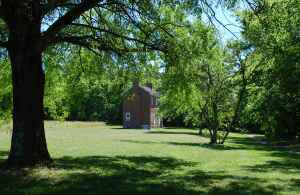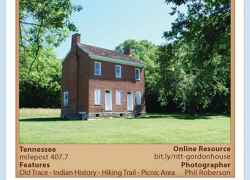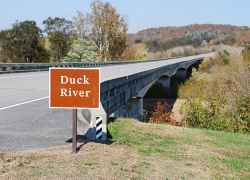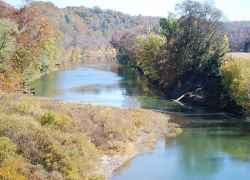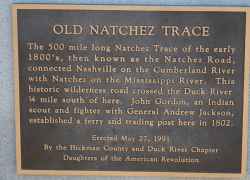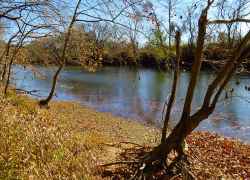One of the few remaining buildings associated with the old Natchez Trace is the house of ferry operator John Gordon. In the early 1800s, Gordon made an agreement with the Chickasaw Chief George Colbert to operate a trading post and ferry on the Duck River. Military expeditions with General Andrew Jackson kept him away from home much of the time. His wife, Dorothea, supervised construction of the present house in 1817-1818. John Gordon died shortly after it was completed, but Mrs. Gordon lived here until her death in 1859.
The 500 mile long Natchez Trace of the early 1800s, then known as Natchez Road, connected Nashville on the Cumberland River with Natchez on the Mississippi River. This historic wilderness road crossed the Duck River one quarter mile south of here. John Gordon an Indian Scout and fighter with Andrew Jackson, established a ferry and trading post here in 1802.
In 1800, stream crossings were critical to the operating of the Natchez Trace. Small trees would bridge small streams but rivers were greater barriers. Large scale bridge building wasn't practical in the wilderness and rivers like this could be forded only during dry periods. A ferry was the best solution. John Gordon, trader, soldier and friend of Andrew Jackson, opened a ferry here in 1803, sharing the profits with Chickasaw Chief George Colbert who by treaty controlled ferries on Indian land. Gordon's ferry crossed the Duck River for over 90 years until a bridge was opened in 1896.
A 10 minute walk beginning at the Gordon House leads to a section of the original Natchez Trace and the Duck River Ferry site.
The 500 mile long Natchez Trace of the early 1800s, then known as Natchez Road, connected Nashville on the Cumberland River with Natchez on the Mississippi River. This historic wilderness road crossed the Duck River one quarter mile south of here. John Gordon an Indian Scout and fighter with Andrew Jackson, established a ferry and trading post here in 1802.
In 1800, stream crossings were critical to the operating of the Natchez Trace. Small trees would bridge small streams but rivers were greater barriers. Large scale bridge building wasn't practical in the wilderness and rivers like this could be forded only during dry periods. A ferry was the best solution. John Gordon, trader, soldier and friend of Andrew Jackson, opened a ferry here in 1803, sharing the profits with Chickasaw Chief George Colbert who by treaty controlled ferries on Indian land. Gordon's ferry crossed the Duck River for over 90 years until a bridge was opened in 1896.
A 10 minute walk beginning at the Gordon House leads to a section of the original Natchez Trace and the Duck River Ferry site.
